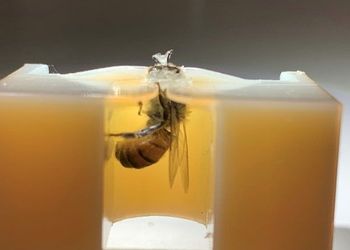Sweating the Nano Stuff

Sweating the Nano Stuff
May 21, 2024When Marissa Beatty, ’17, looks back at what she gained from her education at MSU, where she studied chemical engineering, she recalls how critical her work was in helping communities far from home. Her research was focused on developing electrochemical sensors in a way to ensure rural farmers in India weren’t exposed to harmful nerve agents in fertilizer.
“I see an engineer as being a liaison between the public and the cutting edge of science,” Beatty says. “We're building solutions that go into the public space. And I was just really inspired by that.”
Today, she’s applying her engineering experience to a thornier problem that will benefit an entire sector this time around: In 2022, Beatty founded Turnover Labs, which seeks to shift the chemical industry away from its reliance on petroleum-based chemical building blocks by providing carbon-neutral alternatives born out of CO2 and renewable electricity.
Normal chemical processes run off of heat, which usually comes from a carbon-positive process of burning natural gas. Beatty explains that Turnover’s reliance on renewable electricity ensures they take CO2 runoff and convert it into those building blocks many manufacturers rely on.
“What our customers gain from using our system isn’t just that they're more sustainable, but they're more resilient to when there are shocks in the petroleum market,” Beatty says. “Rather than having to transport methane or oil or coal vast distances because they're not geographically co-located with where those resources are, you can build a chemical plant anywhere and you don't have to worry about like, ‘Oh, this pipeline went down and suddenly we can't get what we need.’ It eliminates the supply chain risk when you take something that you already have on-site and turn it into the things you need.”
A Real Workhorse
This kind of system would develop electrolyzers—an established chemical technology that uses electricity to drive chemical reactions rather than heat—that have a 500% increase in their lifetime and a 40% improvement in energy efficiency compared to conventional electrolyzers.
Funded at first with a $100,000 grant from a New York City fellowship, and then backed by climate-focused investors, Turnover Labs is still fine-tuning its prototype but has already attracted impressive media attention: Beatty was named to the 2024 Forbes 30 Under 30 list.
The New York entrepreneur says what’s critical to building these systems is focusing on their durability and longevity. “We want to increase their ability to operate in harsh conditions like those that would be seen at a chemical manufacturing plant,” Beatty notes. “A good comparison is that we're trying to make more of a tractor rather than a Lamborghini.”
Raised in metro Detroit, Beatty told friends and family since elementary school that she was going to be an environmental biologist. But blame it on her bloodline—both her parents were engineers at Ford—to steer her on a different path.
When she was at MSU studying chemical engineering, she was immediately drawn to every nuance of her studies. “I really liked the chemical side of things because I tend to think about things in a physical sense,” Beatty says. “And I found reactions in molecules at the nanoscale were really easy for me to envision.”
A Path to the Future
Soon after wrapping up her studies at Columbia University, where she earned an M.S. and a Ph.D. in chemical engineering, she participated in the Activate fellowship program in New York, which aims to help scientists commercialize their research. She began expanding on an idea she had worked on during her years at Columbia where building energy-efficient electrolyzers was a top-burner priority.
“Founding a startup made sense for me,” Beatty says. “I could go and I could try to convince some larger company to take a risk on this R&D project that may or may not work, or I could just go start a company and run the R&D and find people who also believe that this thing should exist. To me, that’s a much faster way to get that system built.”
What she finds fulfilling about getting Turnover Labs off the ground is how it can help encourage an entire industry to become more sustainable—and more efficient—at developing chemicals.
“Having results in the lab that show massive improvements rather than marginal, which is how the industry is kind of carried along, is really exciting because you think, ‘Wow. We don't even have to convince them of sustainability alone. This is just a better way to make chemicals.’”
Contributing Writer(s): David Silverberg




